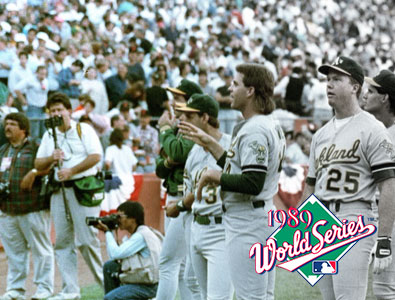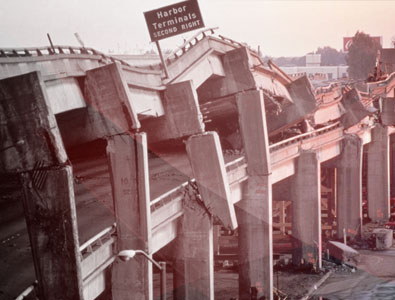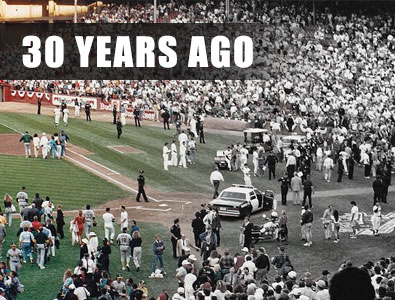On this page
Remembering 30 Years Ago: 1989 World Series Interrupted by Loma Prieta Earthquake
Introduction
Game three of the 1989 World Series was scheduled to start at 5:35 p.m. on October 17, 1989 from Candlestick Park in San Francisco, California. At 5:04 p.m. that night the Loma Prieta earthquake struck the bay area with the fierce and strong forces of mother nature. This natural disaster registered a 6.9 on the Richter scale causing major destruction, devastation, death, and a substantial delay in one of the biggest sporting events of the year in the MLB World Series.
Due to the fact that the two teams playing in the “Bay Bridge Series” as they called it were the San Francisco Giants and the Oakland Athletics, and because both of these franchises were located in the bay area that aspect alone was causing mass hysteria in that region of northern California. Traffic was hectic as people were rushing around prior to the game after their work day or when business hours were ending in order to get to where they were going to take in the festivities of a World Series between basically two home town teams.
The Damage
When the Loma Prieta earthquake hit 30 years ago it resulted in major structural damage to the surrounding area. The collapse of the Bay Bridge and the I-880 Cypress Street Viaduct was the unbelievable damage and devastation that shook the nation. The two tiered bridge of freeway that provided commuters to travel across the bay was highly compromised from devastating effects of the massive earthquake. The top or upper level of that bridge collapsed down upon the bottom or lower level of the bridge ultimately becoming responsible for 42 deaths.
Overall the quake resulted in 3,757 injuries reported in which approximately 400 of those were considered to be series injuries. The death toll was initially estimated at 300, but after the damage was officially surveyed authorities determined that 63 people died. 57 of the fatalities were caused directly from the earthquake with another 6 deaths that were said to be indirectly affected by the earthquake.
Complete chaos spread quickly across the bay area. Power outages were reported throughout the region. Some people recalled that an 8 mile drive took some individuals three to four hours to complete at that time. The Loma Prieta earthquake apparently resulted in an estimated $6 billion in damages which equivalent to $13 billion today making this event the most expensive natural disaster in this nation’s history at the time it occurred. Approximately 12,000 homes as well as 2,600 businesses were considered to be damaged from this earthquake.
Back to Baseball
Although there was a major delay in the World Series resulting from the earthquake games resumed about ten days after it. The series was at two game to none with the advantage to the A’s after the disaster. Game 3 took place on Friday, October 27th, 1989. The series continued to be dominated by the Oakland Athletics.
Game three was a high scoring contest that was noted for setting World Series home run records. There were a combined seven long balls that left the park which was an MLB record that stood until 2017 (Astros and Dodgers). Oakland tied the record for most home runs by one team in a single World Series game with five as the other team to accomplish that was the 1928 New York Yankees with their murderous row of sluggers.
The Oakland Athletics won the third game of the 1989 MLB World Series by the final score of 13-7 as the A’s took a commanding three games to none lead in the series over the San Francisco Giants. Oakland went on to sweep the Giants by winning game four 9-6 and becoming champions. This was only the third time in World Series history that a team never trailed in any game. Dave Stewart was named the most valuable player of the 1989 World Series.
Media Statements
The Loma Prieta earthquake was the first time an earthquake in the United States of America was broadcast by live television. The best way to fully understand the magnitude of this event is to read through the statements and testimonies below from the people involved in this crazy occurrence. This is what the players, coaches, members of the media, etc. had to say:
Al Michaels broadcasted, "I'll tell you what! We're having an earthquake! Well, folks, that's the greatest open in the history of television."
One writer joked, "How did the Russian judge score it?"
Terry Kennedy said. "When it stopped shaking, they played 'We Will Rock You' [on the public address system], and it was a big old joke ... until we heard the reports."
"My brother was a scout for the Giants. He was in the tent outside the Giants clubhouse. He said a couple of minutes before it hit, the police horses went crazy. They could feel it, sense it. They went bonkers," Kennedy explained. "I was sitting on the bench next to [hitting coach] Dusty [Baker]. I had just finished my running, and then came the noise. I'm from California, I've been through earthquakes, but nothing like this. The noise was so loud. It was like placing your ear on the ground next to a train track when the train goes by.
"I looked at the field, and the field was rolling, like a wave of water, two or three feet high. Dusty said, 'Earthquake.' I got out of the dugout immediately. I saw [teammate] Robby Thompson in the tunnel that leads to the field. It's like a tomb in there. He jumped seven stairs at once just to get out. Then the edge of the stadium started to roll. I looked up at the loge level -- I will never forget this -- and there was a guy up there, with one foot on the window sill [of a loge box], and I could see the terror in his eyes. He was thinking about jumping just to get out of there. I thought, 'Don't do it, man. You will land on someone and kill them and kill yourself.'"
A's shortstop, Walt Weiss expressed, "When I felt like I stepped in a giant hole on the field. I had only played one game in my career at Candlestick. I knew it wasn't a great field, but I thought, 'There is no way there is a hole that size in the outfield.' It was the ground, rippling."
"I was running next to [teammate Jose] Canseco, and he told me, 'I feel like I'm going to be sick.' We were so disoriented without even knowing it. But an earthquake was the last thing on my mind. Lights were flickering, but we thought that's what they did to get the crowd going at Candlestick. I was oblivious to it all. It took a good 10 minutes before we realized what was really going on."
"I was looking in the mirror. I didn't want to wear a hat because I wanted to look really good, to look hot, for the pregame introductions,” says Dennis Eckersley. “As soon as it hit, it was like someone had driven a train through the clubhouse door. It was that loud. I knew right away: This is an earthquake. Well, we got out of there -- I mean, pronto. I went out to the parking lot first. It was hazy. It was eerie. Then I went in that long tunnel that led to the field. It was dark in that tunnel, a long, dark tunnel. When I got to the field, I was in denial: 'No, this can't be happening now. It's the World Series. This is all going to go away soon.'"
Dave Stewart said, "I heard nothing. I felt nothing. I had no clue, no idea. Then Harvey, our clubhouse manager, said that everyone had to get out on the field immediately. We didn't know what had happened. We went onto the field, and it was the weirdest thing. I couldn't hear a sound. It was so eerie. But the sound was still unmistakable: It was the sound of fear. You could feel it looking at all the fans in the stands."
"All of a sudden we thought, 'What the heck was that?' It was so loud. It all happened in a split second," Giants reliever Jeff Brantley remembers. "I was standing right next to him, but Mike couldn't hear me. I couldn't hear him. But we both realized that we had to get out of that tunnel. So we started running to the only sign of daylight. The emergency lighting was out. We were tripping over everything in that tunnel. My teammates looked at us when we got out and said, 'Where the heck have you been!?"'
"If it had been a night game," Kennedy said, "it would have been total chaos."
"You can arrest me later," a sports writer exclaimed. "But I am finishing my story!"
"LaCoss had an early cellphone. You know, the ones that charged like $8 a minute," Kennedy explained. "We all called our homes to tell the babysitters that we weren't going to be home for a while. My house was 8 miles from the ballpark. It took three-and-a-half hours to get home."
"My wife, who was then my fiancée, and my dad never made it to the park. They were driving. They said it felt like they got four flat tires at the same time," Weiss said. "The team bus went from Candlestick back to the Coliseum, but it took about four hours to make that trip -- normally, that's a 30-minute trip. Along the way, we saw, like, end-of-the-world-type stuff. Total gridlock. It was so eerie. It was the epitome of chaos. ... I didn't know how bad things in the Bay Area were until the drive back home. And I didn't know that my family was OK until I finally walked in my house."
"They weren't staying there another night. My parents are Alabama folks. They were way out of their comfort zone," Brantley stated. "All the lights were out in the hotel. There were cracks in the walls. And that's when it started to feel like a movie to me."
"I got in my car, in full uniform," says Stewart. "I lived in Emeryville, which is halfway between Oakland and Berkeley. We obviously couldn't use the Bay Bridge. And the San Mateo Bridge wasn't accessible, either. We had to use the Dumbarton Bridge. That's about a 20-to-25-minute drive to my house ... it took me six hours. The Cypress looked like an accordion. It was so mangled. It seemed to me that anyone who was on that freeway when the quake hit did not make it out. I passed that freeway every day on my way to and from the Coliseum. I watched the police frantically pulling people out of the wreckage. That's something I'll never forget."
"It has been 30 years since that happened," Brantley recalls, "and every time I go back to the state of California -- and I mean every single time -- the first thing I think about is looking into the eyes of Mike LaCoss in that tunnel on that terrible day, thinking, 'Oh, my gosh, what is this?'"
"After I got home and knew my family was safe, I changed out of my uniform, and I went back to the Cypress area at about 2 a.m." Stewart explained. "It was utter chaos. I brought some food and some coffee for anyone who might need it. It was like a little city of people who had been removed from their homes. That's when I first realized what a fireman really does. They were pulling out people who were trapped."
"I knew there was very little that I could do, but I wanted to help in any way possible. I went there to see what I could do to help get some things done. The next night, I went back. I rallied a bunch of store owners and market owners to help provide the things that people needed. They all helped with everything. I didn't have to beg. For three or four nights, I went there."
"I already knew Stew for two years. He was already one of the greatest teammates I ever had," Weiss expressed. "He cared about the team. He cared about the community. This was his town. When Stew spoke, he spoke for our entire team. That carried a ton of weight for everyone. He didn't ever talk about all the things he was doing in the community, but we knew those things. We all knew he was really involved. For him, it was close to home -- literally."
"Before that, he was already the leader of our team, and he was an exceptional leader," Eckersley stated. "Most pitchers aren't leaders of teams, but he was the leader of our team. He had a lot of pride in his community in Oakland. He brought it every day. He was the best."
"I remember going to Children's Hospital to visit some kids," Stewart said. "I met a young boy named Julio whose leg had to be severed to get him out of the car in the wreckage. His mom didn't make it. It was an honor for me to see this young man fight his way through. It brought tears to my eyes. I have a picture taken with him. It hangs in my office."
"That's my vaguest memory because there was so many other things going on." Stewart said. "The World Series was threatened. We didn't even know if we were going to play. But [A's manager] Tony [La Russa] made sure we got back to work, just in case. We went to Arizona to play games [against minor leaguers for the A's] because it was a place that there would be fewer distractions. Carney [Lansford], Eck [Eckersley], Hendu [Dave Henderson], Rickey [Henderson], we were all from the immediate [Bay] area, so there were still going to be some distractions. When we all got back together, I don't recall any player saying that we shouldn't be playing the World Series after this, and I don't recall any saying we were ready to play. But once they said the World Series would resume, we all started getting ready."
Kennedy explained, "The A's did the right thing, going to Arizona. I wish we had. We played sim [simulated] games. Our thinking was, 'If we play, we play. If we don't, we don't.' It was hard to get that mojo back."
"We didn't know if we were going to play in three or four days or three or four months. But once the quake came, it didn't seem like the World Series anymore," says Brantley. "I know we're not supposed to feel that way, but that's how it felt. It was time to go home and take care of our families. This was not baseball. This was life. This was a disaster situation."
"But I thought it would be good to start playing again," Stewart declared. "As baseball players, we are, in a sense, entertainers, and I thought it might take people's minds off the tragedy, at least for a while, and concentrate on something good. I knew I was going to be first one [starting pitcher] out of the gate [for Game 3]. I got myself mentally ready. I was trained to do that, but I wanted to do it. I wanted to be on the mound in that situation."
"I was at the Coliseum doing pre- and postgame stuff [earlier this year] when an aunt of Julio reintroduced herself to me," said Stewart. "It was unbelievable. I vaguely remembered her, but she told me how well Julio was doing as an adult. She had tears in her eyes. So did I."
Source:
“'The sound of fear': Thirty years ago, the Loma Prieta earthquake shook the World Series -- and the world”, Tim Kurkjian, espn.com, October 17, 2019.



